Brake maintenance is an important aspect of vehicle safety and requires careful attention to detail. Among the many brake maintenance tasks that need to be performed regularly, cleaning the brake pads is an essential step.
However, some car owners might be unsure how to clean their brake pads, especially when using brake cleaner spray. In this blog post, we will explore the question: Can you spray brake cleaner on brake pads? Their types, potential hazards, and how to use them safely.
We will also discuss the pros and cons of spraying cleaner directly on brake pads and what surfaces to avoid when using it. Lastly, we will inform you about the risks of not using a brake cleaner and why it is important to keep your brakes clean for optimal performance. So, read on to know all about how to use brake cleaners!
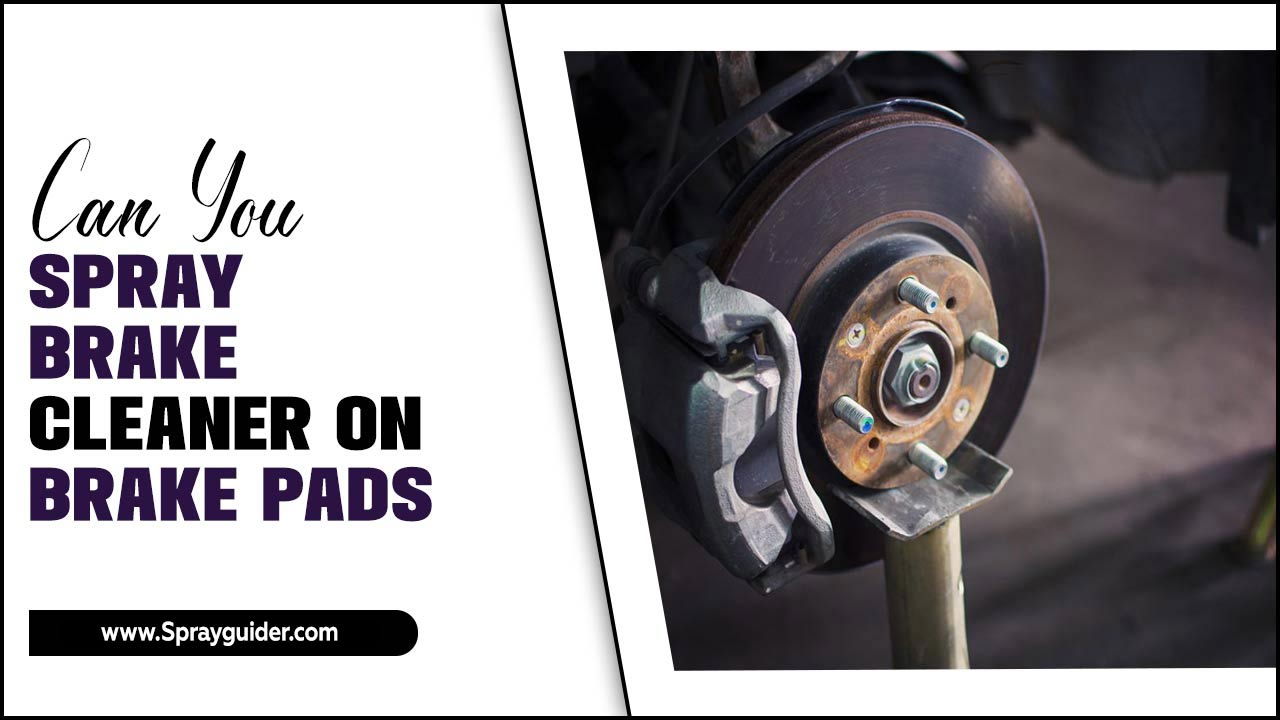
Is Brake Cleaner Essential For Brake Pads?
Using brake cleaner on brake pads can be beneficial in certain situations. Brake cleaner has specific designs to remove dirt, grime, and contaminants from brake components, including brake pads. Cleaning the brake pads with brake cleaner can help enhance their performance and prolong their lifespan.
However, it is important to use the right type of brake cleaner and follow proper safety precautions when using it. Some brake cleaners contain chemicals that can be harmful if not used correctly or if they come into contact with certain materials. It is always recommended to consult the manufacturer’s instructions or seek professional advice before using any cleaning products on your brake pads.
Can You Spray Brake Cleaner On Brake Pads-Detail Explanation
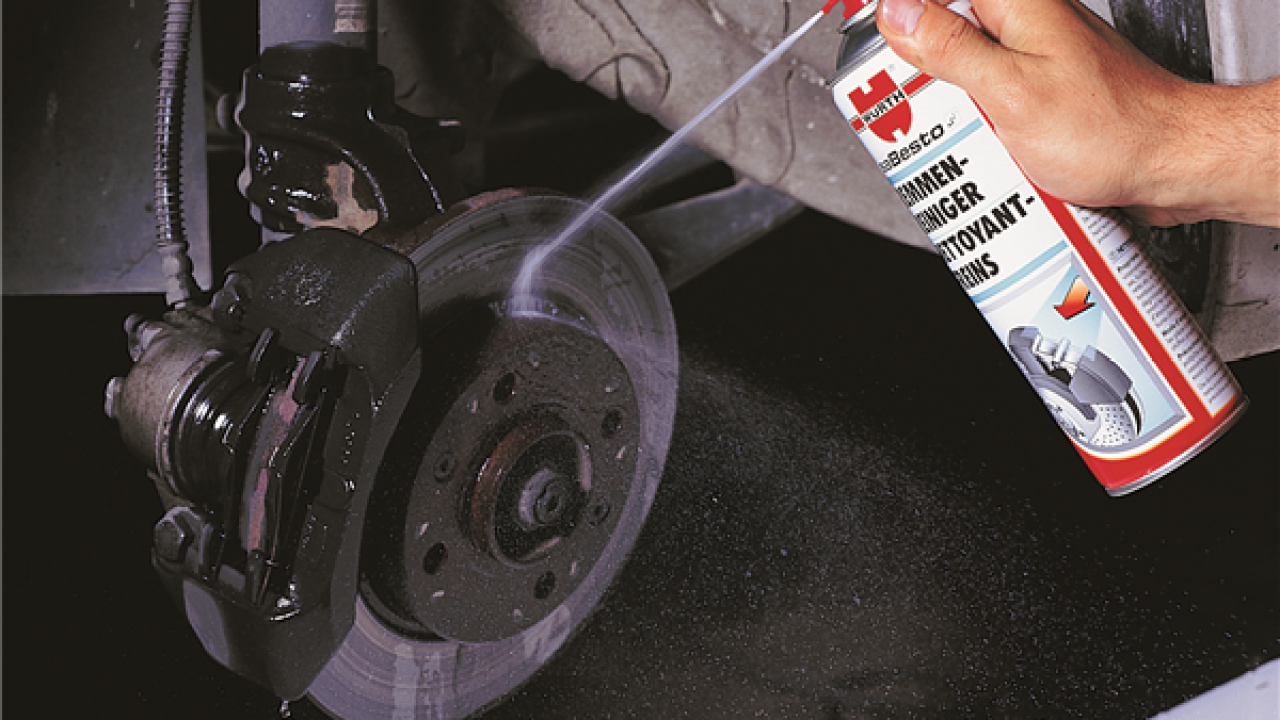
Regarding cleaning brake pads, it is generally not recommended to spray brake cleaner directly onto them. Brake cleaner has specific designs to remove grease, oil, and other contaminants from brake components. While it can effectively clean other parts of the braking system, spraying it directly on the brake pads can damage the friction material and compromise performance.
Instead, using a specialized brake pad cleaner or replacing the brake pads if worn or contaminated is best. It is always important to follow the manufacturer’s recommendations and consult a professional if you have doubts about properly maintaining your brakes.
Types Of Brake Spray Cleaners
When maintaining your vehicle’s brakes, using the right cleaning solutions is important. Brake cleaner has specific designs to clean away oil, grease, and other contaminants that can cause your brake pads to slip or wear down unevenly. Several brake spray cleaners can be handy when cleaning brake pads. Here are some common types:
- Non-Chlorinated Brake Cleaner: This cleaner is safe for all brake pads and can effectively remove grease, oil, and other contaminants.
- Chlorinated Brake Cleaner: While effective at cleaning brake pads, this type of cleaner contains harsh chemicals that can harm the environment and should be used cautiously.
- Biodegradable Brake Cleaner: As the name suggests, this type of cleaner is environmentally friendly and safe for all brake pads.
- High-Temperature Brake Cleaner: Designed specifically for high-performance vehicles with heavy braking systems, this cleaner can effectively remove stubborn residues and improve overall brake performance.
Before using any brake spray cleaner, it is important to read the instructions carefully and follow proper safety precautions. Additionally, it is always a good idea to consult your vehicle’s manufacturer or a professional mechanic for guidance on the best cleaning methods for your specific brake pads.
Understanding Brake Cleaners
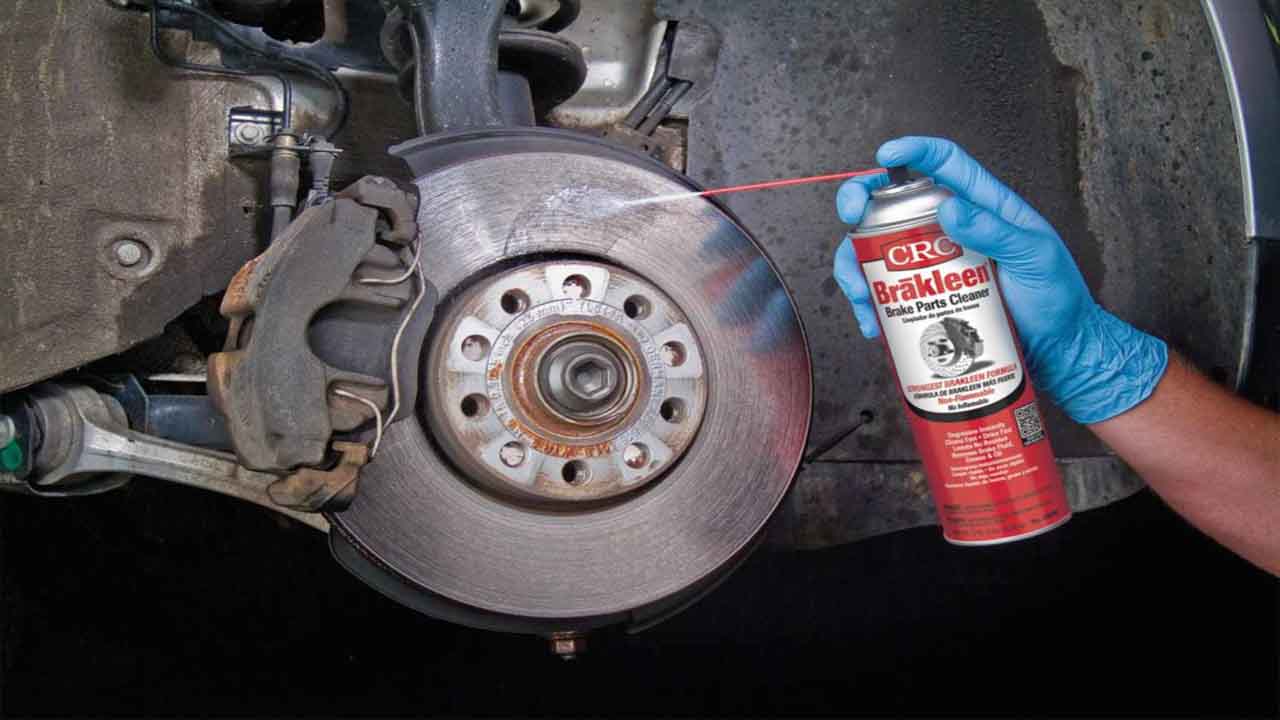
Brake cleaners play a vital role in maintaining the cleanliness and efficiency of your braking system. These solvents remove brake dust, residues, and rust from brake parts, ensuring optimal friction and performance.
Using a brake cleaner, such as a brake parts cleaner, can be a good idea to eliminate any excess cleaner or contaminants that might affect your car’s braking system. Follow the manufacturer’s instructions and use them in a well-ventilated area while wearing safety glasses to avoid further damage.
Potential Hazards Of Brake Cleaners
Brake cleaner is a common cleaning solution used to clean various braking system components, including brake pads. While brake cleaners can effectively remove dirt and debris from brake pads, it is important to exercise caution when using them. Brake cleaners contain chemicals that can be hazardous if not used properly. Some potential hazards of brake cleaners include:
- Toxic Fumes: Brake cleaners often emit toxic fumes that can be harmful if inhaled. Using these products in a well-ventilated area or wearing appropriate respiratory protection is important.
- Skin Irritation: The chemicals in brake cleaners can cause skin irritation and rashes. It is recommended to wear gloves when handling these products to minimize contact with the skin.
- Eye Damage: If brake cleaner comes into contact with the eyes, it can cause severe eye irritation and damage. It is crucial to wear protective eyewear when using brake cleaners.
- Environmental Impact: Brake cleaners contain chemicals harmful to the environment if not disposed of properly. It is important to follow local regulations to dispose of these products safely.
To ensure your safety and minimize potential hazards, it is advisable to read and follow the instructions provided by the manufacturer when using brake cleaners on brake pads.
How To Spray Brake Cleaner On Brake Pads?
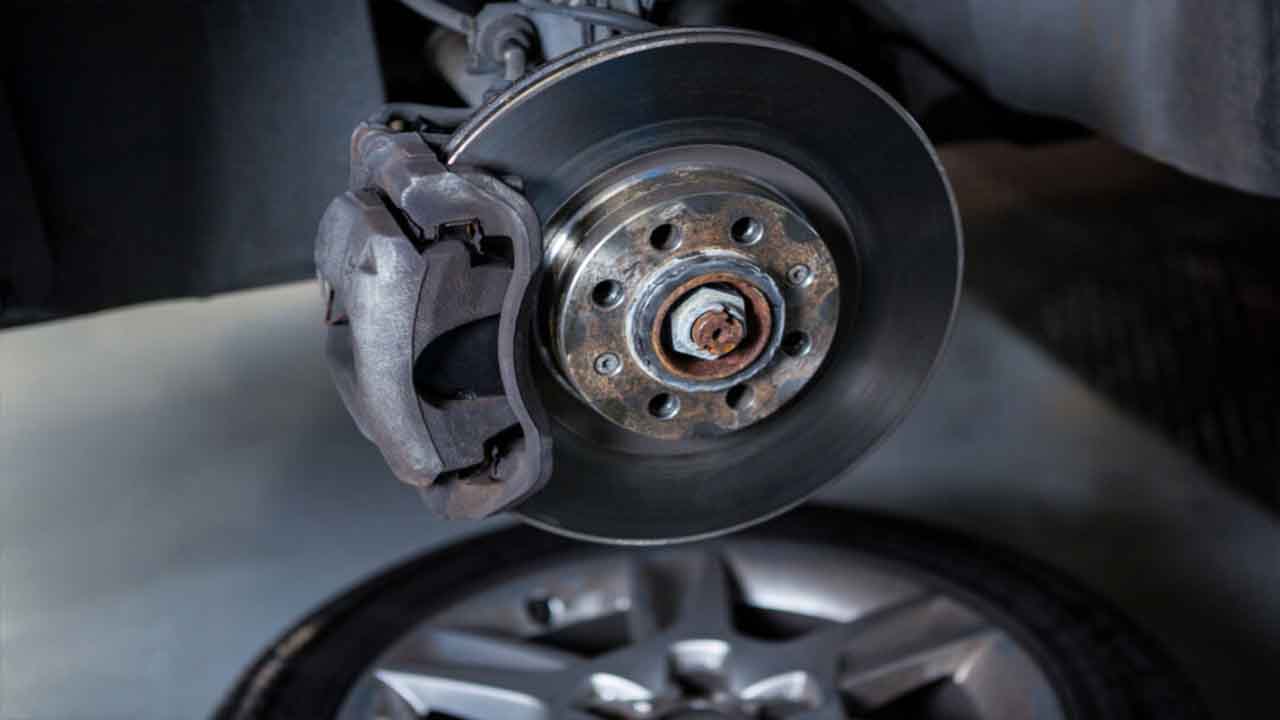
When it comes to cleaning brake pads, it is important to use caution and follow manufacturer guidelines. While brake cleaners can clean brake parts such as calipers and rotors, spraying it directly onto brake pads is not recommended. Spraying brake cleaner on brake pads can be a helpful maintenance step for keeping your brakes in good condition. Here’s how to properly spray brake cleaner on brake pads:
- Start lifting the car and removing the wheels to access the brake pads.
- Use a wrench or socket set to remove the caliper bolts and carefully slide the caliper off the rotor.
- Once the caliper is off, you will have clear access to the brake pads. Use a wire brush or scraper to remove any loose debris or dirt from the surface of the pads.
- Shake the can of brake cleaner well and spray it directly onto both sides of each brake pad. Make sure to cover the entire surface area.
- Allow the brake cleaner to sit for a few minutes to penetrate and dissolve any built-up grime or residue.
- After a few minutes, use a clean cloth or paper towel to remove any excess brake cleaner from the pads.
- Reinstall the caliper onto the rotor and tighten the bolts securely.
- Repeat this process for all of your brake pads.
Regularly spraying brake cleaner on your brake pads can help remove any contaminants that may affect their performance and extend their lifespan. However, it’s important to note that spraying excessive amounts of brake cleaner can potentially damage other braking system components, so always follow manufacturer recommendations and exercise caution when applying it.
Precautions For Using Brake Cleaner
Brake cleaner is a chemical solvent commonly handy to clean automotive brakes. It is designed to remove oil, grease, and other contaminants, including brake pads, from brake components. However, the use of brake cleaner on brake pads can be a controversial topic. Here is a list of precautions to follow when using brake cleaner:
- Read The Manufacturer’s Instructions: Before using any brake cleaner product, read and understand the instructions provided. This will ensure that you use the product correctly and safely.
- Use In A Well-Ventilated Area: Brake cleaner contains chemicals that can be harmful if inhaled. It is important to use it in a well-ventilated area, such as outdoors or in a garage with open doors or windows. Avoid using it in enclosed spaces where fumes can accumulate.
- Wear Protective Gear: When using brake cleaner, it is recommended to wear gloves and safety goggles to protect your skin and eyes from potential contact with the product.
- Keep Away From Heat Sources: Brake cleaner is highly flammable, so it should be kept away from heat sources such as open flames, sparks, or hot surfaces. Store it in a cool, dry place away from direct sunlight.
- Avoid Contact With Painted Surfaces: Brake cleaner can damage painted surfaces, so be careful not to spray it directly onto painted areas of your vehicle. If needed, cover these areas before applying the brake cleaner.
- Dispose Of Properly: Brake cleaner is considered hazardous waste and should not be poured down drains or thrown into regular trash bins. Follow local regulations for proper disposal methods and consider taking it to a designated hazardous waste facility.
By following these precautions, you can use brake cleaner on brake pads while ensuring your safety and minimizing potential risks or damages.
What Should You Avoid When Using Brake Cleaner?
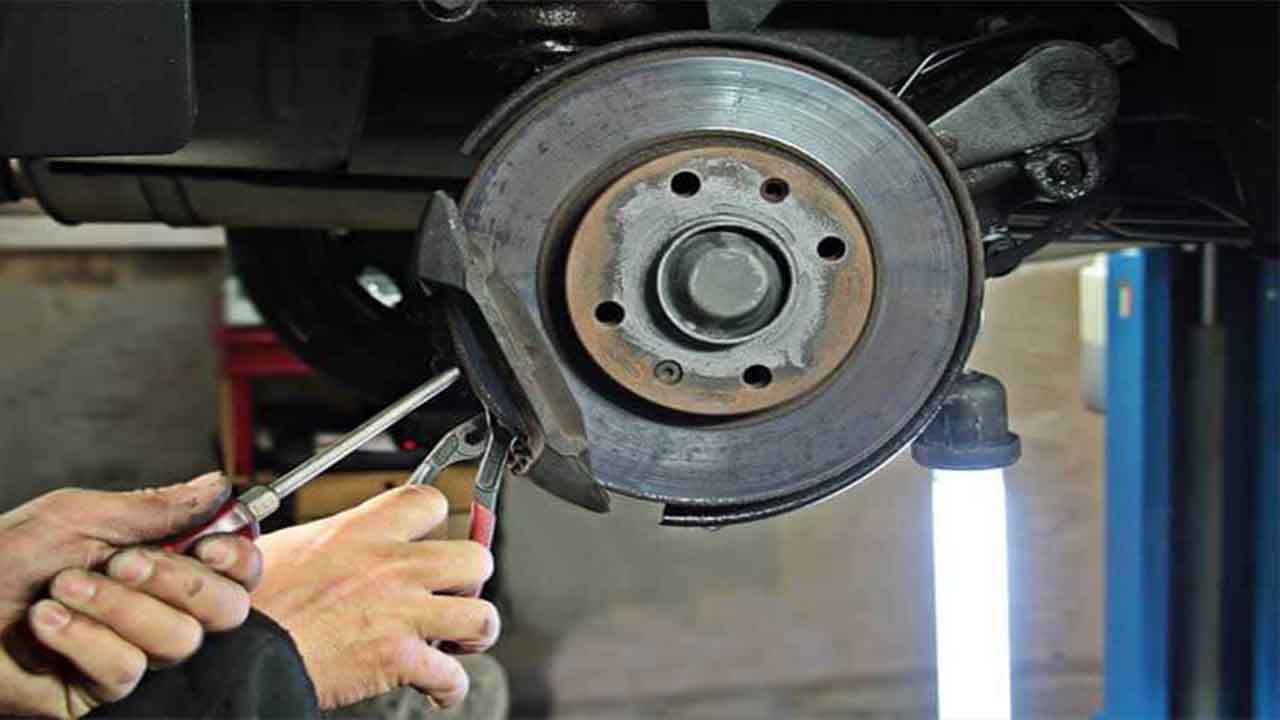
It is not recommended to spray brake cleaner directly on brake pads. Brake pads come with materials designed to provide friction against the rotor, creating the necessary stopping power for your vehicle.
When it comes to using brake cleaner on brake pads, there are a few things you should avoid to ensure your safety and the effectiveness of your brakes. Here is a list of what you should avoid when using brake cleaner:
- Do not spray brake cleaner directly onto hot brake components. The high temperature can cause the cleaner to evaporate quickly, potentially leading to inhalation of harmful fumes or even combustion.
- Avoid getting brake cleaner on rubber seals or other rubber components. Brake cleaners typically contain chemicals that can degrade rubber, causing it to deteriorate over time.
- Refrain from using excessive amounts of brake cleaner. A little goes a long way, and using too much can create a mess and potentially contaminate surrounding areas.
- Never use brake cleaner near open flames or sparks. Brake cleaner is highly flammable, so keeping it away from any potential ignition sources is important.
By following these precautions and using brake cleaner responsibly, you can effectively clean your brake pads without compromising your safety or the performance of your brakes.
Risks Of Overusing Brake Cleaner
Overusing brake cleaner can have detrimental effects on sensitive brake parts. The excessive use of brake cleaner may leave residue on brake pads, compromising their performance. Using too much brake cleaner can even cause brake dust to become airborne, posing a risk to your health.
Moreover, the overuse of brake cleaner can lead to the degradation of brake linings, further damaging your car’s braking system. Additionally, excessive use of brake cleaner releases volatile organic compounds (VOCs) into the air, contributing to environmental pollution.
Pros And Cons Of Spraying Cleaner On Brake Pads
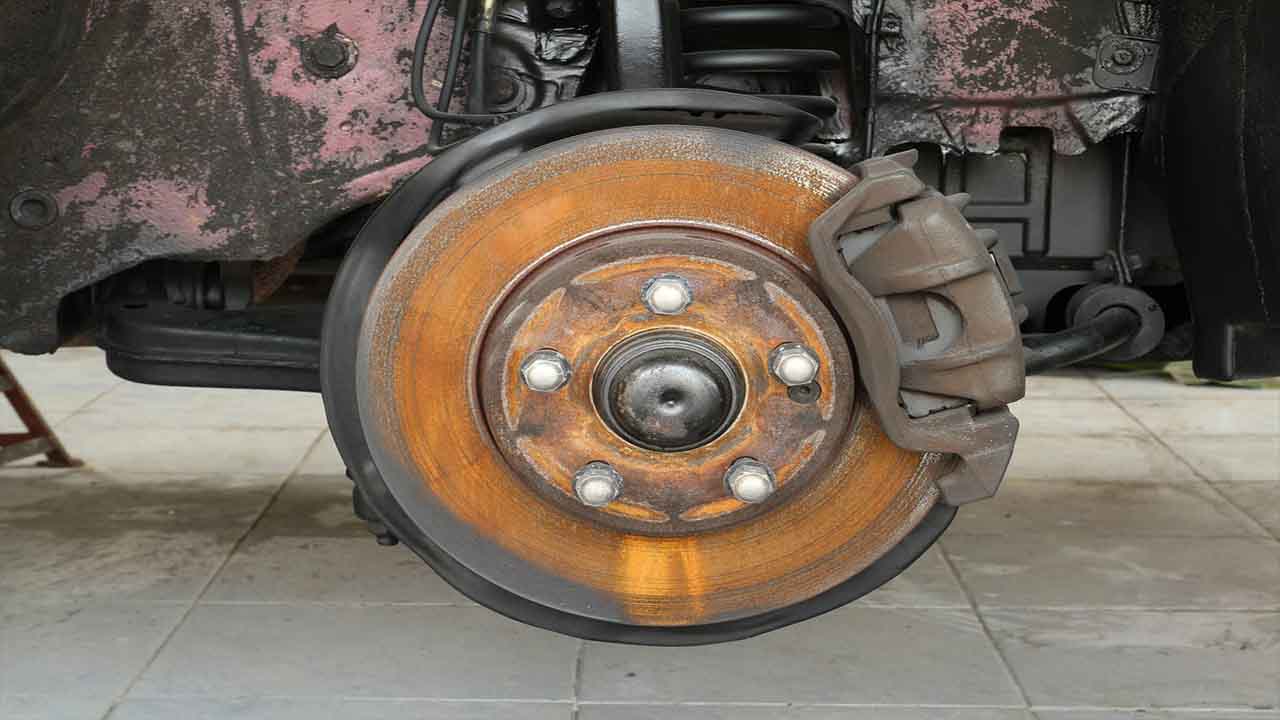
A brake cleaner is a solvent-based cleaning agent commonly used to remove dirt, grime, and oil from various parts of a vehicle’s braking system. Spraying brake cleaner on brake pads can have both pros and cons. Here is a list of some potential advantages and disadvantages to consider:
Pros:
- Removes Dirt And Debris: Brake cleaners can effectively remove built-up dirt, dust, and grime from the brake pads, which can help improve their performance.
- Increases Braking Efficiency: By removing contaminants from the brake pads, spraying brake cleaner can help restore their original friction properties, resulting in better braking performance.
- Extends Pad Life: Regularly cleaning brake pads with a suitable cleaner can help extend their lifespan, preventing the accumulation of debris that can cause premature wear.
Cons:
- Potential Damage To Other Components: Brake cleaners are often formulated with chemicals that can be harsh on certain materials, such as rubber or plastic. If not used correctly or sprayed excessively, it could damage surrounding components.
- Toxic Fumes: Brake cleaners typically contain volatile organic compounds (VOCs) that can emit toxic fumes when sprayed. Using brake cleaner in a well-ventilated area or with proper respiratory protection is important.
- Safety Precautions Required: Brake cleaners are flammable and should be used cautiously to avoid fire hazards. Following the manufacturer’s instructions and taking necessary safety precautions when using these products is essential.
Overall, spraying brake cleaner on brake pads can be beneficial for maintaining optimal performance and extending their lifespan. However, using the appropriate product and following safety guidelines is important to avoid any potential risks or damage to other components.
What Happens If You Don’t Use Brake Cleaner On Brake Pads?
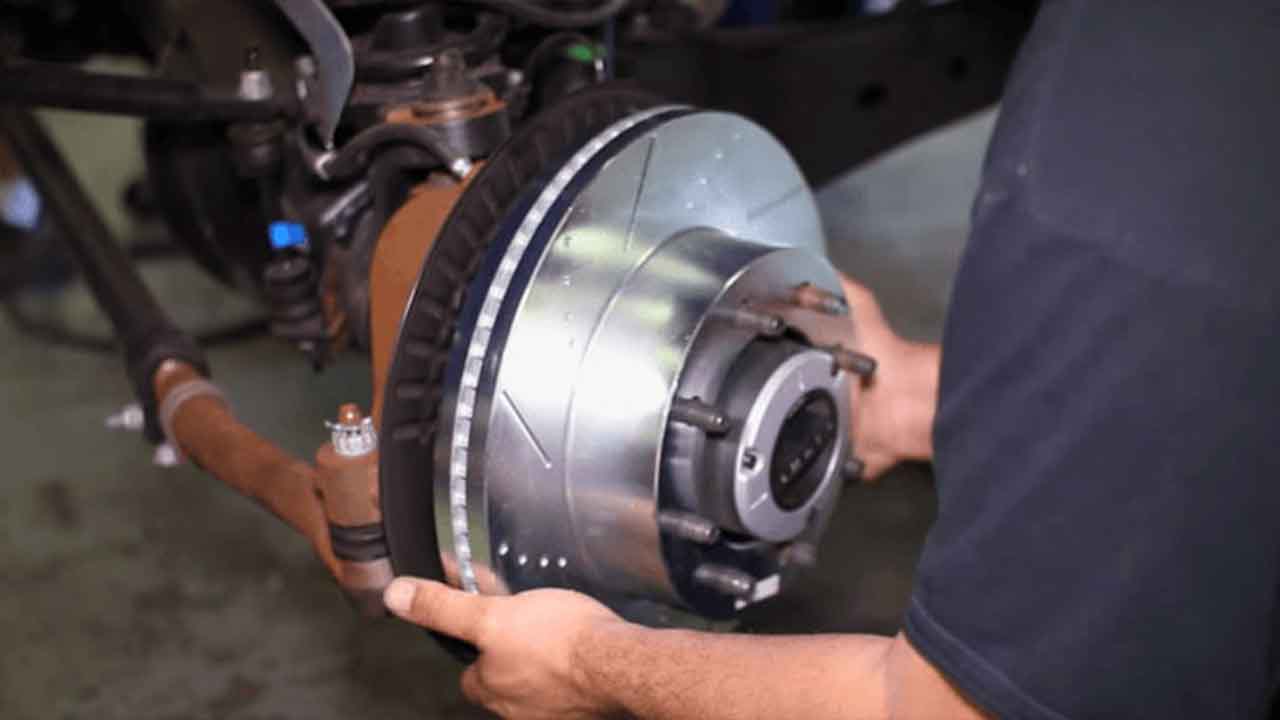
Using brake cleaner on brake pads is not recommended. Brake cleaner is a powerful solvent designed to remove oil, grease, and other contaminants from brake components. While it may seem logical to use brake cleaner on brake pads to ensure they are clean and free from debris, doing so can have negative consequences.
Brake cleaners can leave behind a residue on the brake pads that can reduce their effectiveness and cause them to squeal or squeak when applied. It is best to follow the manufacturer’s recommendations for cleaning and maintaining your brake system, which typically involves using a specific type of brake cleaner or a mild detergent solution.
Conclusion
To ensure your brake pads’ longevity and optimal performance, it is important to prioritize safety and follow the recommended practices. A brake cleaner is essential for maintaining your brake pads but should not be directly sprayed on them. Instead, use it to clean other brake components such as calipers, rotors, and brackets.
Applying brake cleaner directly on the plates can cause damage and compromise their effectiveness. Always exercise caution and follow the instructions provided by the manufacturer when using brake cleaner.
We have provided bulk information can you spray brake cleaner on brake pads? and hope our information was helpful from your perspective. By taking these precautions, you can keep your brake pads in top condition and ensure your safety on the road.
Frequently Asked Questions
1.Should You Spray Brake Cleaner On Brakes?
Ans: Using brake cleaner on brakes is generally safe, but caution must be taken. Never spray brake cleaner directly on brake pads or rotors. Instead, apply it to a clean cloth and wipe down the brakes. Always follow the instructions and precautions on the label of the brake cleaner can.
2.What Can I Spray On Brake Pads?
Ans: To keep your brake pads in top condition, it is important to use a specially formulated brake cleaner. Avoid spraying other cleaning products or sprays on your brake pads, as they can damage and affect their performance. If you’re unsure, consult a professional mechanic for guidance.
3.Where Do You Spray Brake Cleaner On The Brakes?
Ans: To effectively clean your brakes, spray brake cleaner on the brake rotor and caliper. Avoid spraying directly on the brake pads, as it can cause damage. Be careful not to get brake cleaner on any rubber components. Use a wire brush or sandpaper to clean the brake pads if needed. Always follow the instructions on the product for best results.
4.Can I Spray Brake Cleaner On Squeaky Brakes?
Ans: Yes, it is possible to use brake cleaner on squeaky brakes. Brake cleaners can effectively remove debris that may be causing the squeaking noise. However, it’s important to follow the instructions on the can and avoid spraying it on any plastic or rubber components. If the noise persists, it could be a sign of worn brake pads and should be inspected by a professional.
5.Is It Safe To Spray Brake Cleaner On Brake Pads?
Ans: Spraying brake cleaner directly on brake pads is not recommended. It can damage the rubber components and lead to brake failure. Instead, use a specialized brake cleaner designed for brake components. Always follow the manufacturer’s instructions and take necessary safety precautions.
Meet Allen Yu, the Spray Guru behind Spray Guider. With a passion for transforming rides into rolling works of art, Allen Yu specializes in Bike and Car Sprays. Unleash your vehicle’s potential with expert tips and creative inspiration. Elevate your ride with Allen Yu—because every spray tells a story!
